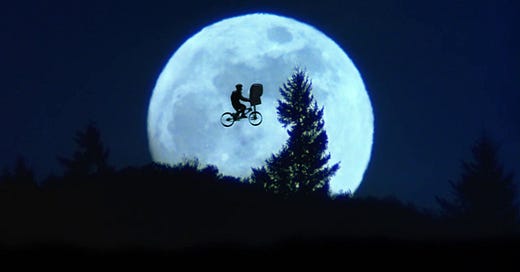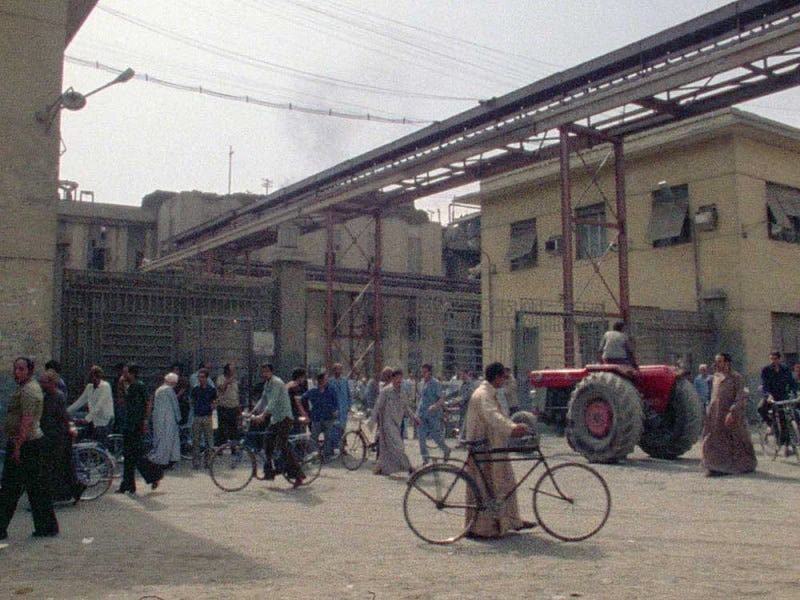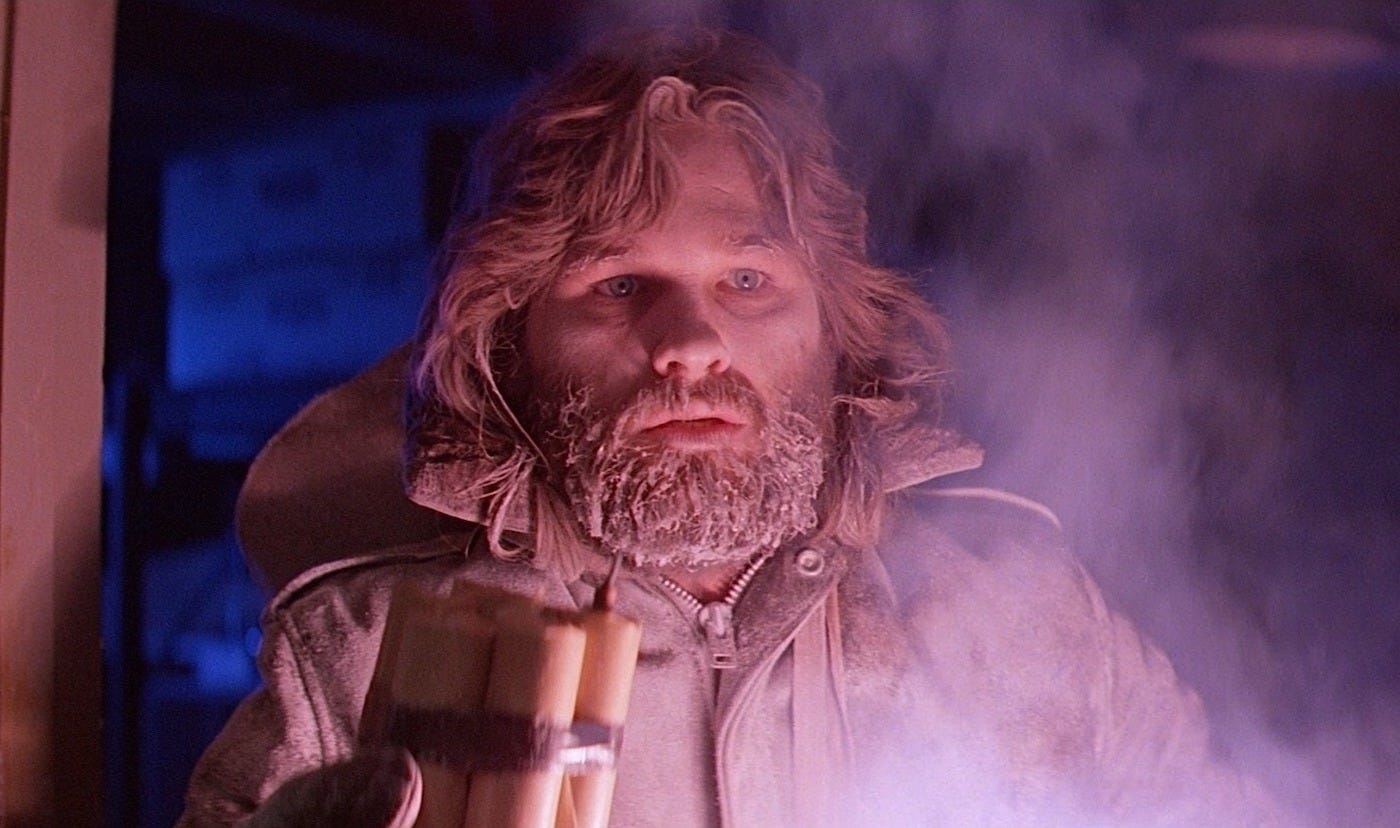The 1,000 Greatest Films: February/March '25 Update [#634-637]
Too Early / Too Late, The Thing, The Age of the Earth, E.T. the Extra-Terrestrial
Okay, so my Top 1000 Films project has been placed slightly on the back-burner as of late, mainly due to the age-old excuses of work and life, as well as the fact that, any precious time I have had for movies, has been spent either actually visiting the cinema, or diving headfirst into the complete works of Rainer Werner Fassbinder. Expect articles on both. That being said, I’ll always find the time for a couple a month at the very least, so here’s a very belated update on what I ticked off in February & March. A mixed bag, with two very artsy & difficult foreign films (Too Early / Too Late, A Idade da Terra) and two popular American classics, albeit both very different in style (The Thing, E.T. the Extra-Terrestrial). These are just the twists & turns that you love to see from a Top 1000 Journey.
Next month (I keep saying this) I’m going to return to some more structured viewing in terms of ticking off one year at a time — I’ve got one more film from 1981, then I’ll be fully focusing on 1982. And, since I’m watching everything by Fassbinder, there’ll be a Top 1000 Films - Fassbinder Supplement post covering all of his films that place in the Top 1000 at some point… probably this year, but at some point. Ah, cinema.
Log #634
Too Early / Too Late (1981, dir. Jean-Marie Straub & Danièle Huillet) [Ranked #859 on 2025’s TSPDT Top 1000 Edition]
I’ve crossed paths with the legendary avant-garde filmmakers Straub–Huillet a couple of times before (Chronicle of Anna Magdalena Bach, Machorka-Muff) — real intimidating, intellectual stuff. Too Early / Too Late is maybe the most challenging film I’ve seen from them so far, working as effectively a visual essay in which they read Marxist theory aloud over images of the rural French countryside in the first half, and then workers of Cairo in the second. They seek to draw a connection between the two places, musing on the idea of revolutionary action throughout history. I guess the point is that this action either comes too early, or too late. Duh. This is a beautiful film, with quite an incredible use of natural sound. Its subject matter was completely over my head, but it’s one of the few intensely artsy films on this list that I’m actually keen to come back to — soon as I’ve completed cinema and read all of Marx, or something.
Log #635
The Thing (1982, dir. John Carpenter) [Ranked #211 on 2025’s TSPDT Top 1000 Edition]
Horror master John Carpenter’s The Thing, despite being a critical & box office failure upon release, has now long been considered one of his greatest efforts, as well as one of the best horror films ever made. I had seen this once before and, while appreciating its atmosphere and effects, I struggled to get into the narrative and the characters. Unfortunately, the same thing happened again with this rewatch, however I think that’s my bad — a bad case of phone-brain had me zoning out at times. One of Roger Ebert’s most infamous misses was his review of this film, which similarly mentions the focus on atmosphere/effects over the characters, and I don’t want to sound like that guy, what the hell did he know? A fair bit, as it goes, but The Thing obviously rocks, okay. I just haven’t had that mind-blowing experience with it yet. A late night cinema screening would likely change that — just saying, @ GFT.
I (totally legally) obtained a 4K rip of The Thing for this viewing, and damn, this film does look (and sound) absolutely incredible. It’s hard not to keep banging on about “atmosphere”, but what Carpenter achieves through the lighting and use of colour in this film is remarkable — that aspect alone earns its place among those “best horror ever” debates. Those icy blues really pop, and any scene with a flare in it looks stunning. The score (by Ennio Morricone!) is never overbearing, deftly contributing to the underlying atmosphere without defining it, and Kurt Russell is probably at his best in the lead role here.
The great thing about this film is how unique and singular a film Carpenter manages to craft from the simplest of concepts. This effectively boils down to an Alien-esque story of paranoia and claustrophobic survival, with added shapeshifting, but The Thing never once feels derivative or clichéd. I still don’t feel that I fully “get” this film as much as my mutuals (near exclusive 4.5/5 stars on Letterboxd), however it’s a ton of fun, and clearly one of the ultimate B-movies. Good stuff.
Log #636
A Idade da Terra [The Age of the Earth] (1980, dir. Glauber Rocha) [Ranked #770 on 2025’s TSPDT Top 1000 Edition]
Okay, it can be said that I like some pretty artsy cinema at times, and I’ve certainly watched a lot of artsy cinema on this Top 1000 mission, but we’ll need to file this one under the Final Boss category, I’m afraid. This was the last film directed by Glauber Rocha, a legendary figure in Brazilian cinema for his founding role in the Cinema Novo movement, before his death the following year, aged just 42. Rocha is perhaps most well known for Black God, White Devil from 1964, frequently mentioned among the best Brazilian films of all time.
This is a fiercely avant-garde swansong from Rocha, flowing like a visual poem for 154 minutes of frenetic, vibrant and incisive footage of Brazilian society. The sheer kinetic force of this film reminded me of Kalatozov’s I Am Cuba, which is a personal favourite of mine. Unlike my (fairly surface level) understanding of Cuban political history, I don’t really know a thing about Brazil’s situation in the 20th century, therefore I didn’t have a clue what was going on throughout this film. That being said, the images are infectious and boisterous in themselves, and the entire thing carries such an intensity and desperation that I think he gets his point across. Only for the serious Marxist revolutionary art-heads.
Log #637
E.T. the Extra-Terrestrial (1982, dir. Steven Spielberg) [Ranked #132 on 2025’s TSPDT Top 1000 Edition]
It’s fitting that I should talk about E.T. in the same post as The Thing, because the unprecedented success of Spielberg’s feel-good family take on extraterrestrial life was one of the key reasons cited for Carpenter’s more gruesome and nihilistic film bombing at the box office. Whether that’s a fair analysis or not, I really don’t know, it’s hard to fathom now how the box office would have operated in the 1980s. That being said, they do represent two polar opposite approaches to the ‘alien’ movie, and it’s interesting that this theme was so prevalent in the public consciousness at the time. Anyway, Spielberg’s E.T. is of course one of the defining films of the 1980s, and one of the most cross-generational family classics of all time. It broke the highest grossing box office record held by Star Wars (fucking Star Wars, you know), and kept that record for 11 years, until Spielberg beat himself with Jurassic Park. The fucker.
…And yet, the first thing I think of in relation to E.T. is still this tweet, inarguably one of the greatest posts of all time: “Me and my friends would’ve killed E.T. with hammers I can tell you that much”. Yeah, that pretty much summarises how I feel about this film. Listen, as I’ve said before, I’m not too much of an arthouse snob for some Spielberg movie magic, far from it, but E.T. in particular is probably just a little too far into Kids’ Film territory to do all that much for me these days. And that’s fine, as a kids’ film I really can’t fault this all too much, it is genuinely magical in a way that younger generations would still find captivating (I hope). The Halloween sequence in particular is superb, still memorable to me despite not having seen this since I was a kid myself, and the film strikes a positive tone through being genuine and unapologetically heartfelt — it’s sappy, but it is a kids’ film, mate.
One thing I really appreciated about E.T. on this rewatch was its refusal to present an idealised and perfect familial world for its protagonist, something all too common (understandably) in family films. This makes sense, as the idea for E.T. was born of Spielberg’s own childhood experience of his parents’ divorce (imaginary friend and all), and the background of a broken home lends the narrative a realism and poignancy that doesn’t detract from its overall positive tone. You can tell that this is deeply personal stuff from Spielberg, and while I don’t think you’d ever call his films soulless blockbusters, his intimate connection to the material here shines through, illuminating Allen Daviau’s inspired cinematography with genuine warmth and colour. And that John Williams score is fucking undeniable.








